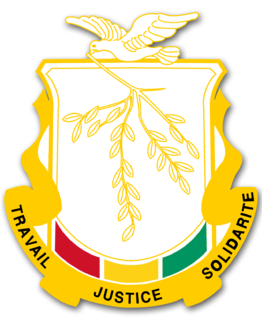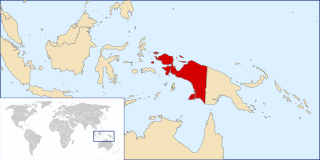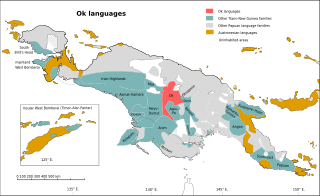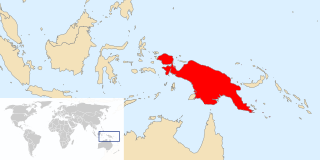
Equatorial Guinea, officially the Republic of Equatorial Guinea, is a country located on the west coast of Central Africa, with an area of 28,000 square kilometres (11,000 sq mi). Formerly the colony of Spanish Guinea, its post-independence name evokes its location near both the Equator and the Gulf of Guinea. Equatorial Guinea is the only sovereign African state in which Spanish is an official language. As of 2015, the country had an estimated population of 1,222,245.

Guinea, officially the Republic of Guinea, is a west-coastal country in West Africa. Formerly known as French Guinea, the modern country is sometimes referred to as Guinea-Conakry to distinguish it from other countries with "Guinea" in the name and the eponymous region, such as Guinea-Bissau and Equatorial Guinea. Guinea has a population of 12.4 million and an area of 245,857 square kilometres (94,926 sq mi).
The modern state of Guinea did not come into existence until 1958, but the history of the area stretches back well before European colonization. Its current boundaries were determined during the colonial period by the Berlin Conference (1884–1885) and the French, who ruled Guinea until 1958.

Politics of Guinea takes place in a framework of a presidential representative democratic republic, whereby the President of Guinea is both head of state and head of government of Guinea. Executive power is exercised by the government. Legislative power is vested in both the government and the National Assembly.

Guinea-Bissau, officially the Republic of Guinea-Bissau, is a country in West Africa that covers 36,125 square kilometres (13,948 sq mi) with an estimated population of 1,874,303.

Papua New Guinea, officially the Independent State of Papua New Guinea, is a country in Oceania that occupies the eastern half of the island of New Guinea and its offshore islands in Melanesia, a region of the southwestern Pacific Ocean north of Australia. Its capital, located along its southeastern coast, is Port Moresby. The western half of New Guinea forms the Indonesian provinces of Papua and West Papua. It is the world's 3rd largest island country with 462,840 km2 (178,700 sq mi).

Bissau is the capital city of the West African Republic of Guinea-Bissau. In 2015, Bissau had a population of 492,004. Bissau is located on the Geba River estuary, off the Atlantic Ocean, and is Guinea-Bissau's largest city, major port, and its administrative and military centre.

Conakry is the capital and largest city of Guinea. A port city, it serves as the economic, financial and cultural centre of Guinea. Its population as of the 2014 Guinea census was 1,660,973.

Port Moresby, also referred to as Pom City or simply Moresby, is the capital and largest city of Papua New Guinea and the largest city in the South Pacific outside of Australia and New Zealand. It is located on the shores of the Gulf of Papua, on the south-western coast of the Papuan Peninsula of the island of New Guinea. The city emerged as a trade centre in the second half of the 19th century. During World War II it was a prime objective for conquest by the Imperial Japanese forces during 1942–43 as a staging point and air base to cut off Australia from Southeast Asia and the Americas.

The guinea pig or domestic guinea pig, also known as cavy or domestic cavy, is a species of rodent belonging to the family Caviidae and the genus Cavia. Despite their common name, guinea pigs are not native to Guinea, nor are they biologically related to pigs, and the origin of the name is still unclear. They originated in the Andes of South America, and studies based on biochemistry and hybridization suggest they are domesticated descendants of a closely related species of cavy such as C. tschudii, and therefore do not exist naturally in the wild. They were originally domesticated as livestock, as a source of food, and continue to be.

Lieutenant general Teodoro Obiang Nguema Mbasogo is an Equatoguinean politician who has been President of Equatorial Guinea since 1979. He ousted his uncle, Francisco Macías Nguema, in an August 1979 military coup and has overseen Equatorial Guinea's emergence as an important oil producer, beginning in the 1990s. Obiang was Chairperson of the African Union from 31 January 2011 to 29 January 2012. He is the second longest consecutively serving current non-royal national leader in the world.

The Territory of Papua comprised the southeastern quarter of the island of New Guinea from 1883 to 1975. In 1883, the Government of Queensland annexed this territory for the British Empire. The United Kingdom Government refused to ratify the annexation but in 1884 a Protectorate was proclaimed over the territory, then called "British New Guinea". There is a certain ambiguity about the exact date on which the entire territory was annexed by the British. The Papua Act 1905 recites that this happened "on or about" 4 September 1888. On 18 March 1902, the Territory was placed under the authority of the Commonwealth of Australia. Resolutions of acceptance were passed by the Commonwealth Parliament, who accepted the territory under the name of Papua.

Western New Guinea, also known as Papua, is the Indonesian part of the island of New Guinea. Since the island is alternatively named as Papua, the region is also called West Papua. Lying to the west of the independent state of Papua New Guinea, it is the only Indonesian territory to be situated in Oceania. Considered to be a part of the Australian continent, the territory is mostly in the Southern Hemisphere and also includes nearby islands, including the Schouten and Raja Ampat archipelagoes. The region is predominantly covered with ancient rainforest where numerous traditional tribes live, such as the Dani of the Baliem Valley, although a large proportion of the population live in or near coastal areas, with the largest city being Jayapura.

The Papua New Guinea national cricket team, nicknamed the Barramundis, is the team that represents the country of Papua New Guinea in international cricket. The team is organised by Cricket PNG, which has been an Associate Member of the International Cricket Council (ICC) since 1973. Papua New Guinea previously had One-Day International (ODI) status, which it gained by finishing fourth in 2014 World Cup Qualifier. Papua New Guinea lost both their ODI and T20I status in March 2018 after losing a playoff match against Nepal during the 2018 Cricket World Cup Qualifier, a result that earned ODI and T20I status for their opponents. On 26 April 2019, at the final World Cricket League 2 fixture; PNG defeated Oman to finish at the fourth position and reclaim their ODI status.

Oksapmin is a Trans–New Guinea language spoken in Oksapmin Rural LLG, Telefomin District, Sandaun, Papua New Guinea. It has been influenced by the Ok languages, and the similarities with those languages were attributed to borrowing in the classifications of both Stephen Wurm (1975) and Malcolm Ross (2005), where Oksapmin was placed as an independent branch of Trans–New Guinea. However, Loughnane (2009) and Loughnane and Fedden (2011) demonstrated that it is related to the Ok languages, though they share innovative features not found in Oksapmin.

The 2012 Africa Cup of Nations, also known as the Orange Africa Cup of Nations for sponsorship reasons, was the 28th edition of the Africa Cup of Nations, the football championship of Africa organized by the Confederation of African Football (CAF).
The Papua New Guinea national rugby union team, nicknamed the Pukpuks,, played its first international in 1966, defeating Vanuatu 47-3. Papua New Guinea have not so far qualified for a Rugby World Cup. They participated in the Oceania World Cup qualifying tournaments for the 2007, 2011 and 2015 World Cups, but did not qualify.

The Oksapmin languages are a family of a score of related Trans–New Guinea languages spoken in a contiguous area of eastern Irian Jaya and western Papua New Guinea. The most numerous language is Ngalum, with some 20,000 speakers; the best known is probably Telefol.

The continent of Australia, sometimes known in technical contexts by the names Sahul, Australinea, or Meganesia to distinguish it from the country of Australia, consists of the land masses which sit on Australia's continental plate. This includes mainland Australia, Tasmania, and the island of New Guinea, which comprises Papua New Guinea and Indonesia's Western New Guinea. Situated in the geographical region of Oceania, it is the smallest of the seven traditional continents in the English conception.

New Guinea is a large island separated by a shallow sea from the rest of the Australian continent. It is the world's second-largest island, after Greenland, covering a land area of 785,753 km2 (303,381 sq mi), and the largest wholly or partly within the Southern Hemisphere and Oceania.

















